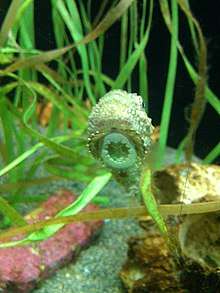Pacific spiny lumpsucker
The Pacific spiny lumpsucker (Eumicrotremus orbis) is a species of bony fish in the family Cyclopteridae.
| Pacific spiny lumpsucker | |
|---|---|
.jpg) | |
| Scientific classification | |
| Kingdom: | Animalia |
| Phylum: | Chordata |
| Class: | Actinopterygii |
| Order: | Scorpaeniformes |
| Family: | Cyclopteridae |
| Genus: | Eumicrotremus |
| Species: | E. orbis |
| Binomial name | |
| Eumicrotremus orbis Günther, 1861 | |
| Synonyms | |
| |
Description
The pacific spiny lumpsucker is a globular shaped fish that typically measures 1 to 3 inches (2.5 to 7.6 cm) in length, with a maximum known length of around 7 inches (18 cm).[1][2] The body of the fish is covered in cone-shaped plates, called tubercles.[1][3] Females are dull green in color, while males are dull orange to reddish brown.[4]
The pacific spiny lumpsucker's pelvic fins have evolved into a large suction cup, allowing it to attach to surfaces.[1][3] Pacific spiny lumpsuckers are most commonly found attached to solid objects and are ineffective swimmers.[1] They are considered harmless to humans.[2]

Distribution and habitat
Pacific spiny lumpsuckers are found from northern Washington state to the Aleutian Islands of Alaska.[1] They can also be found in the Chukchi Sea and around northern Japan.[2]
This species inhabits a wide variety of habitats, including eelgrass beds, rocky reefs, kelp patches, shallow bays, and docks.[1] They can be found in near shore waters to a depth of 500 feet (150 m).[1][3]
Ecology
Diet
Pacific spiny lumpsuckers feed on slow crustaceans, worms, and mollusks on the sea floor.[5]
Reproduction
This species is known to spawn in shallow waters between the months of July and October.[5] The females lay large, spherical, orange-colored eggs on rocks.[5] Females typically lay around 200 eggs at a time.[4] After the eggs are laid, the male attaches himself to a nearby surface where he cares for the eggs by defending them from predators and circulating water over them with his fin.[5]
Predators
Pacific cod, sablefish, and lancefish are known predators of pacific spiny lumpsuckers.[5]
References
- Paul., Humann (1996). Coastal fish identification : California to Alaska. Hall, Howard, 1949-, McDaniel, N. G. (Neil Glenn), 1949-, DeLoach, Ned. Jacksonville, FL: New World Publications. ISBN 1878348124. OCLC 35233771.
- "Eumicrotremus orbis summary page". FishBase. Retrieved 2018-08-18.
- N., Eschmeyer, William (1983). A field guide to Pacific Coast fishes of North America : from the Gulf of Alaska to Baja, California. Herald, Earl Stannard. Boston: Houghton Mifflin. ISBN 0395331889. OCLC 8668331.
- Arita, George S. (1969). "Sexual Dimorphism in the Cyclopterid Fish Eumicrotremus orbis". Journal of the Fisheries Research Board of Canada. 26 (12): 3262–3265. doi:10.1139/f69-312. ISSN 0015-296X.
- Pacific, Aquarium of the. "Pacific Spiny Lumpsucker". www.aquariumofpacific.org. Retrieved 2018-08-18.